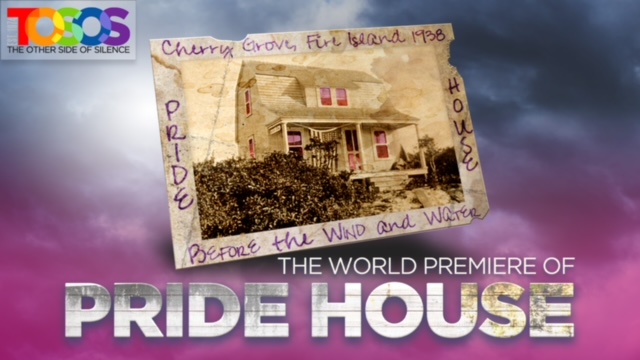Now celebrating the 50th anniversary of its founding by playwright and gay rights activist Doric Wilson in 1974, TOSOS (The Other Side of Silence) – NYC’s oldest and longest-producing LGBTQIA+ theater company – has opened its milestone season with the world-premiere production of Chris Weikel’s Pride House, a fictionalized look at a momentous time in the development of Cherry Grove as a favorite summer retreat and safe haven for the queer community. Inspired by his own love of, interest in, and time spent there, and informed by cultural anthropologist and author Esther Newton’s 1993 book Cherry Grove, Fire Island: Sixty years in America’s first gay and lesbian town, Weikel, as stated in his program notes, takes artistic license with some of the real-life people and events in his story for the sake of drama (and sharp-witted comedy!), while masterfully capturing the challenges of the era, defining the distinctive personalities of his characters, and creating a highly entertaining and compelling play that pays tribute to a landmark place and era in gay history.
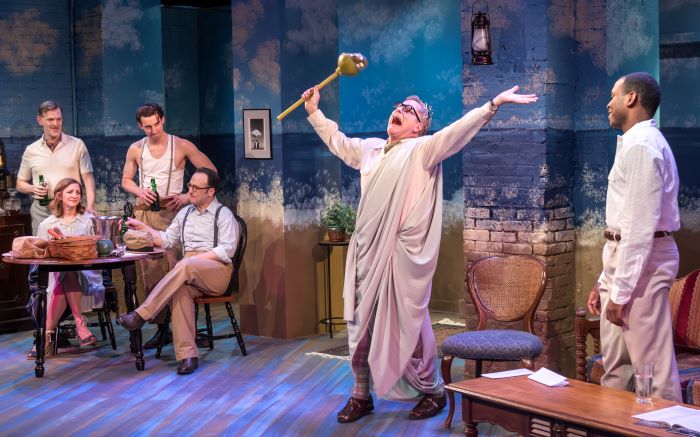
Set in 1938-39, at the still-extant eponymous cottage, named in honor of Jane Austen’s classic novel Pride and Prejudice (and, unwittingly, a prescient indication of the Gay Pride movement to come), the narrative revolves around the wealthy socialite and gay ally Beatrice Farrar, an influential figure in the evolution of Cherry Grove, who owns and co-habits the oceanside summer home with her out ex-husband and Broadway set designer Thomas, where she is known for hosting lavish parties for their circle of gay friends from the NYC theater scene.
While her guests enjoy some freedom from the period’s rampant homophobic laws, police raids, discrimination, and persecution, their flamboyant presence raises issues with the town’s “family folk” and Property Owners Association, including neighbors Irene and George Gerard. When Beatrice invites the straight couple to her end-of-the-season festivities, the great hurricane of 1938 isn’t the only storm that rages that night, resulting in a determined rebuilding of the community, its burgeoning demographic, and identity as “America’s First Gay and Lesbian Town.”
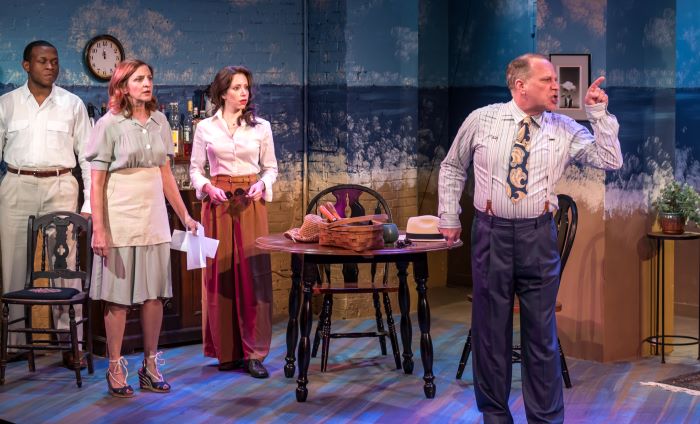
Under the direction of Igor Goldin, an engaging cast of thirteen embodies the array of distinctive individuals, their attitudes, inter-relationships and confrontations, in roles that are given three-dimensional depth, psychological insight, and comedic flair in Weikel’s richly layered script. There are smart references to Chekhov’s The Cherry Orchard, a laugh-out-loud campy segment of the wildly costumed theater artists recreating and shooting a scene from Cecil B. DeMille’s 1934 film Cleopatra, clever wordplays and suggestive double-entendres (e.g., one popular pick-up area in Cherry Grove is known as The Bridge of Sighs – “or is it Size?”).
There are also telling metaphors and significant parallels – between the hurricane and the party, and the shocking racial slurs and sexual repression in the US and the rise of Hitler and anti-Semitism in Europe (in a revealing sub-plot, Beatrice is presently housing, and practicing her French on, Hugo and Maxine Franc, a very young and very sophisticated Jewish ex-patriate prince and princess from France, there to escape the growing threat of Nazism in Europe, who clearly prefer the gay characters to the Gerards). It all makes for an amusing and thought-provoking work that keeps the audience laughing and thinking.
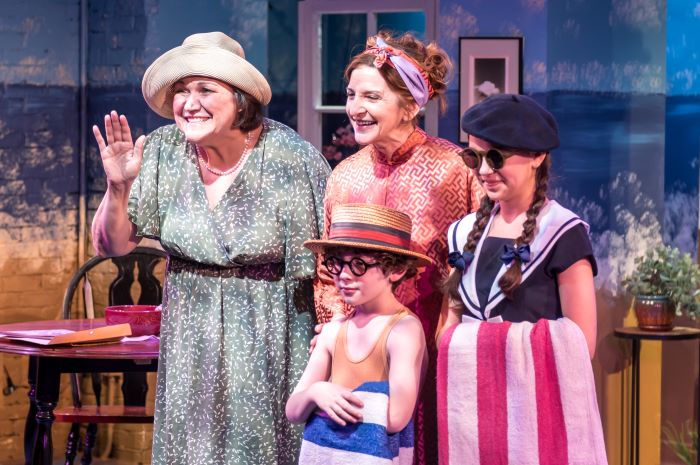
Each of the actors, led by the excellent Jamie Heinlein as Beatrice – a driving force in the development and redevelopment of Cherry Grove, an ardent supporter of her chosen family, and a lover of the pleasures of life and gin (even if it’s before noon!) – is well-cast and convincing, from Patrick Porter’s heavy-drinking, often insulting and combative Thomas, Gail Dennison and Desmond Dutcher as the conservative Gerards (longtime residents opposed to the increasingly visible gay population), and the close circle of theater artists and “pouffs” who frequent Fire Island (Tom Souhrada as the flamboyant Arthur Brill, who preens and poses as the drag Cleopatra; Jake Mendes as the acerbic Stephen, who is “so last season” to the roving Thomas; Alex Herrera as the surprisingly sensitive eye-candy Brad, who initiates a romance with Aaron Kaplan’s reserved and discreet journalist and theater critic John Mosher; and London Carlisle as Edwin Marshall, a famed Black dancer, consistently subjected to racist insults, who questions if life in Cherry Grove is right for him and prepares to make a break from the hurt Thomas), to Jessica DiSalvo as the forthright Italian-born Natalia Danesi Murray, a Broadway star and young widow, pursuing a relationship with the unseen Janet and uncertain about how it will be received by the public. Rounding out the fine company are Dontonio Demarco as the town’s even-tempered harbor master and repairman Poppy Frederick, Calvin Knegten as Prince Hugo, and Raquel Sciacca as Princess Maxine.
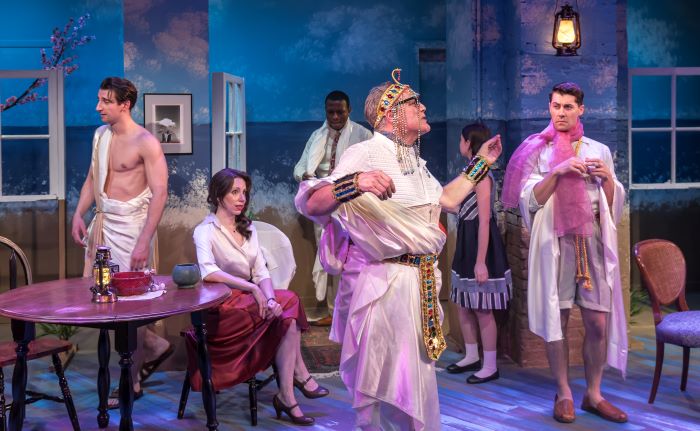
The show’s artistic design is equally successful in transporting us to the time and locale of the story. Evan Frank’s set, with a casual but tastefully appointed interior, fully stocked (and frequently used!) bar, suspended window frames, and murals of the sea and sky, is enhanced with Morry Campbell’s soundscape of waves and seagulls, and wind and thunder when the hurricane hits, and by David Castaneda’s shifts in lighting. Costumes by Ben Philipp are eye-catching and appropriate to the period and the characters (the vintage swimsuits and over-the-top theatrical garb for Cleopatra are especially noteworthy).
As with all of TOSOS’ productions, Pride House is an illuminating and engrossing exploration of gay culture, history, and experience, filled with humor and heart, top-notch acting, direction, writing, and design, and a powerful message of the importance of community. Kudos to the entire cast and team for another outstanding and relevant evening of theater.
Running Time: Approximately two hours and 25 minutes, including an intermission.
Pride House plays through Saturday, February 10, 2024, at The Flea Theater, 20 Thomas Street, NYC. For tickets (priced at $40, plus fees), go online.


